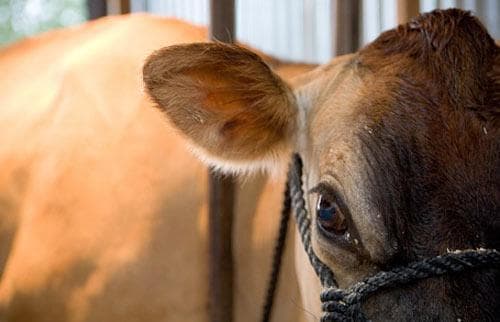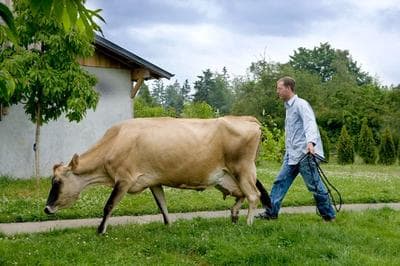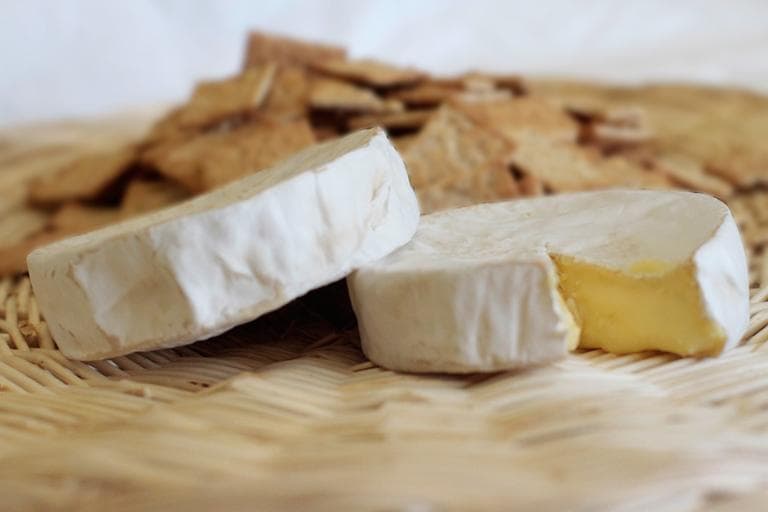Advertisement
Back To The Farmland
ResumeThe dream and reality of living off the land. A novice farmer tells his story.

Everybody wants to shop at the farmers market these days and a whole lot of people seem to be dreaming of farming themselves — getting back to the land, anyway. Some chickens, a goat, their own veggies, maybe a real crop.
Kurt Timmermeister did it, almost by accident. Bought four acres on an island off Seattle. Then bought more. Tried honey bees and sheep. Tomatoes and kale. Goats and cows and butchering himself. It was a big, long learning curve. Hard work. He’s finally found his way.
This hour On Point: becoming a farmer.
- Tom Ashbrook
Guests:
Kurt Timmermeister is founder of Kurtwood Farms, a thirteen-acre dairy farm in Vashon, Washington which specializes in cheese production and weekly local dinners. His book is "Growing a Farmer: How I Learned to Live Off the Land."
Rebecca Gould is associate professor of religion and environmental studies at Middlebury College, and author of "At Home in Nature: Modern Homesteading and Spiritual Practice in America."
Extra: Watch videos of Kurt Timmermeister on-site at his cheese cave.

Book Excerpt from "Growing a Farmer":
Chapter One - Before the Farm
When I was twenty-four years old I opened my first restaurant. It was a small, actually very small, ten-foot by twenty-foot, café. With just four tables squeezed together and a minuscule kitchen on the side, this humble space represented the start of my career. I had worked as a waiter and a pastry cook around town and felt that I could run a restaurant better than my much more experienced bosses and coworkers. Despite this confidence, I really had no clue what I was up against and was immediately overwhelmed by the difficulties of owning and managing a business.

Every morning at four I would walk the two blocks from my small studio apartment in downtown Seattle to the café and bake pastries in the manner of a home cook. The kitchen was tiny, the equipment of small scale and my volume of baked goods originally very limited; one pound cake, a couple of coffee cakes, four dozen biscuits. At seven in the morning the café would open and I would sell the fresh pastries and coffee to the receptive locals who would line up daily. They could see into the small kitchen, see the mixer, watch the rolls come out of the oven and onto the counter in front of them. What was significant to me about this entire process was there was integrity; I bought butter and flour and baked it into pastries and handed it to people to eat right there. Yes, this is the description of every bakery the world over, but I thought, perhaps arrogantly, that no one was doing it so directly. I reached into the oven, pulled out a biscuit and placed it on a plate. I had made that biscuit, I had served it and the customer ate it. There were no cake mixes, no canned fillings, no waiters, no corporate offices. I sold goods for cash and then walked across the street to the bank and put the money in the bank. It was real and it was good. This influenced the way I would look at my world henceforth, though this simple and satisfying arrangement couldn’t last.
As the café grew to be more popular and therefore more profitable, I realized I could afford to buy a house and settle down, move out of my small studio in the city. If I could have afforded a home in the city, I most likely would have stayed in Seattle. Even then, twenty years ago, the price of real estate in the city was quite high and well out of my reach.
My universe at the time was the café and my apartment, both in downtown Seattle. I began to look for less expensive places to live that had the luxury of space. Seattle is located on Puget Sound, an expansive protected body of water dotted with islands that extend northward to Canada. The island closest to downtown Seattle, and accessed by ferryboats that docked a few blocks from my apartment, is Bainbridge Island. Originally I checked out homes there, but found them to be too costly. South of Bainbridge Island is Vashon Island, accessed by state ferryboats as well, but much less conveniently; the dock is located in West Seattle, a long trek from downtown Seattle.
In addition to simply finding a home on Vashon Island cheaper than I could in Seattle, there was also the pull of nature. My impression at that time was that life would be easier in a small town, that life outside of the turmoil of a large city would be serene, orderly and tranquil. I confess that all these many years later I continue to fall into this flawed thinking. And so I began my search for a new home: I wanted more space than my humble apartment offered, situated far enough from the city to be affordable. I wasn’t looking to become a farmer; the thought hadn’t even crossed my mind. I just wanted a place where I could unwind after my grueling days at the café.
This program aired on April 8, 2011.